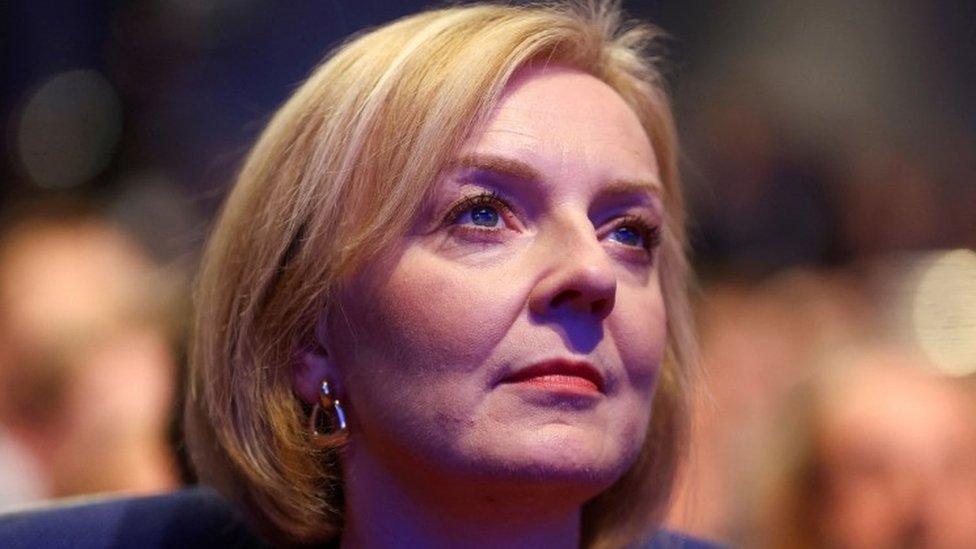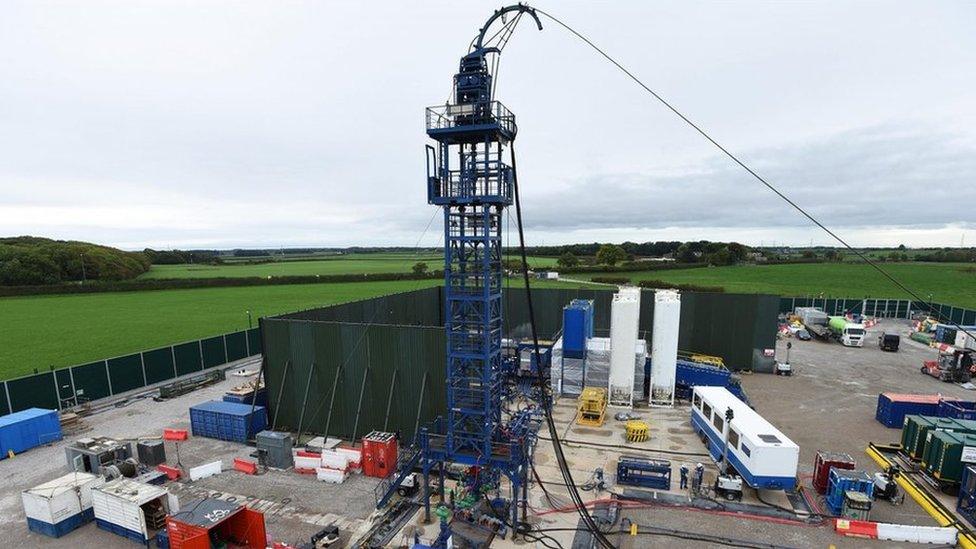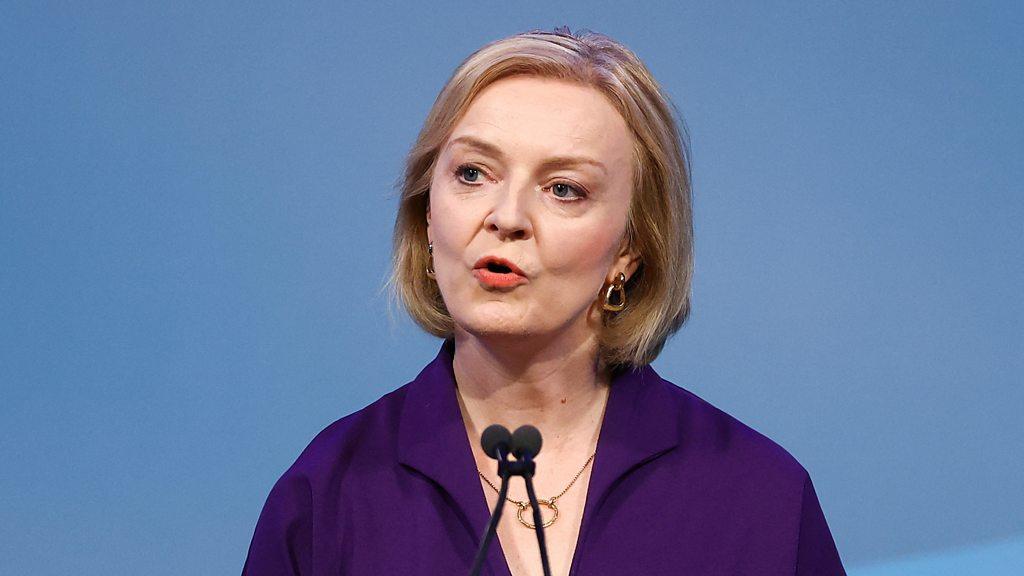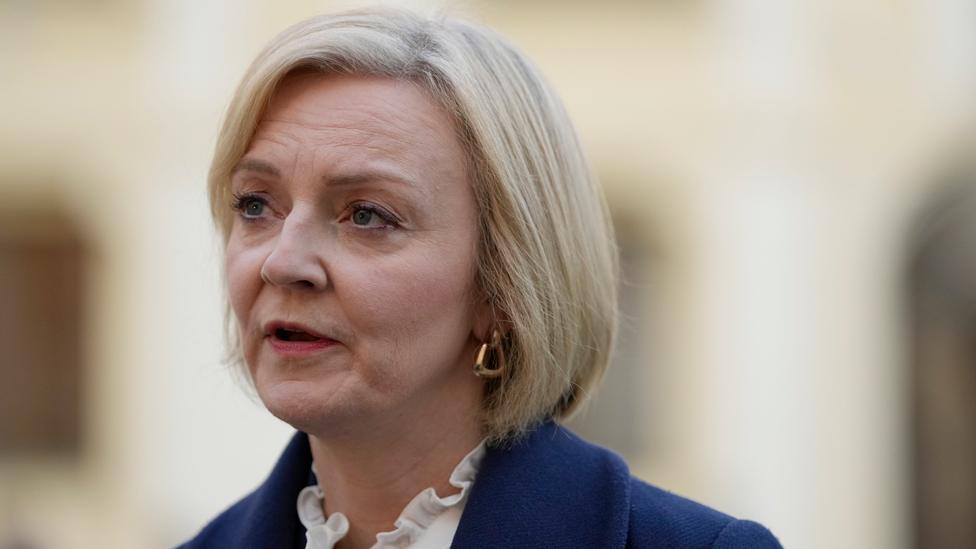Liz Truss: The pitfalls lying ahead of an embattled prime minister
- Published

Liz Truss is battling to save her premiership after just over a month in the job - what are the key hurdles she faces?
Halloween horror show?
Two things are going to happen on 31 October which could spook MPs.
Chancellor Jeremy Hunt will publish independent forecasts for the UK's economic outlook, by the Office for Budget Responsibility (OBR).
And he will set out details of spending cuts and possible tax rises he will say are needed.
The chancellor has already ditched nearly all of his predecessor Kwasi Kwarteng's tax-cutting mini budget, in the biggest economic U-turn in British history.
Many Conservative MPs have said they are waiting to see what Mr Hunt has to say, and how the markets react to it, before deciding whether to continue supporting Liz Truss.
The OBR forecasts are expected to be bleak. The Institute for Fiscal Studies suggests the UK economy is facing a £60bn "black hole", while press reports suggest the OBR analysis will point to a larger gap of £72bn.
The £32bn package of tax cut reversals and rises announced by Mr Hunt this week will only take the chancellor part of the way to filling that, although there is much uncertainty around the numbers.
Spending cuts
Jeremy Hunt has already told government departments to come up with efficiency savings, and warned that public spending will not rise as quickly as some had expected.
In plain language, that means spending cuts.
Mr Hunt has said he is "not taking anything off the table".

The UK is committed to military aid to Ukraine
Health, education and defence are the biggest spending departments, but cutting the budget of any of these would be politically toxic and hard to sell to Tory MPs.
Defence Secretary Ben Wallace - tipped by some as a potential replacement for Ms Truss - has said he intends to hold the PM to her promise to increase defence spending to 3% of GDP by 2030.
The welfare budget, which is the biggest source of cash spending, could end up taking the hit.
Pensions triple lock
The state pension - the biggest item in the welfare budget, according to the OBR, external - has long been seen as untouchable in British politics, with both Labour and the Conservatives promising to keep the triple lock guarantee. This is the policy which ensures the state pension goes up in line with inflation or average earnings or 2.5%, whichever is highest.
Under the guarantee, state pensioners would get a rise of about 10% in April 2023, which would take their weekly payment from £185.15 to just over £200.
Chancellor Jeremy Hunt indicated on Monday that the government was no longer committed to the triple lock, as he sought savings. This was echoed by the foreign secretary on Wednesday morning.
But Liz Truss told MPs she remains committed to the triple lock, at Prime Minister's Questions at midday on Wednesday.
The PM's official spokesman said Ms Truss had agreed to keep the triple lock after discussions with the chancellor, but declined to say whether she had overruled Mr Hunt.
Ms Truss believes pensioners are in a "unique position" because they are "unable to increase their earnings through work", her spokesman said.
Uprating benefits
The chancellor could also attempt to break the previous government's commitment to ensure that benefits increase in line with the rising cost of living.
But this would not go down well with many Tory MPs, including Commons leader Penny Mordaunt, another figure tipped as a replacement for Ms Truss, who have argued strongly against it.
Some benefits - such as the disability living allowance - do have to be uprated in line with inflation, by law. If the government wanted to uprate those benefits in line with earnings instead, it would need to pass a whole new law, which would face stiff resistance inside and outside Parliament.
There are different rules for other benefits, including universal credit, which can be increased through tweaks to existing law.
Fracking
One of Liz Truss's first acts as prime minister was to announce an end to the ban on fracking, as part of a package of measures to boost domestic energy production.
But she has said it would only resume where there is local consent - and the government has yet to spell out how this will be sought.
A number Tory MPs have spoken out against the resumption of fracking, which was banned in 2019, reflecting constituents' concerns about earth tremors.
However, given that overturning the ban does not require a new law, MPs may have to find other ways to get ministers to back down.
Labour is attempting to force a Commons vote on banning fracking and is urging Tory MPs to back it.
The opposition has already warned Tory MPs they will use the issue of fracking to campaign at the next election.

Ms Truss's government has backed fracking as a way to boost the UK's domestic gas supplies
Planning reform
The government still plans to push ahead with potentially controversial planning law reforms, which were a key part of Liz Truss's plan to boost economic growth.
Ms Truss wants to deregulate planning, cutting environmental regulations and reducing the number of affordable homes in new developments. She also wants to scrap centrally-set housing targets. Some of the plans could be unveiled before 31 October, but they may prove difficult to get through.
Attempts by Boris Johnson's government to fast track new developments had to be rethought after opposition from backbench Tory MPs.
Net zero review
In 2019, the UK made a legally binding commitment to reach the target of net zero carbon emissions by 2050. When he was prime minister, Mr Johnson was an enthusiastic supporter of net zero.
But at a time of historically high energy prices and soaring inflation, some Tory MPs have questioned the wisdom of spending money on hitting the target.
Their concerns have been taken on board by Ms Truss, who has commissioned an independent review into the delivery of net zero.
Led by former energy minister Chris Skidmore, the review with a focus on "ensuring the UK's fight against climate change maximises economic growth, while increasing energy security and affordability for consumers and businesses".
He will report to the government with a set of recommendations by the end of this year.
Related topics
- Published20 October 2022

- Published5 September 2022

- Published10 October 2022
